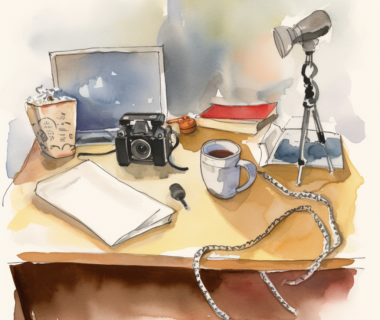Picture this.
You’ve written a post that you want to share on social media, or you’ve made a video somehow or another. You’re sitting there on the edge of your chair, just about to click post, but you look at what you’ve written, what you’ve made, you notice that final error, you question yourself, thinking about the manifold ways in which people could be judging you silently and from afar, contemplating in your mind’s eye the dialogues that must be taking place.
“Oh my gosh, this person wrote this?”
“Oh my gosh. Did he really make that grammatical error?”
“Wow, this is boring. Why am I even watching?”
“How could he make such a video?”
And so the thoughts come out, percolate like coffee through filter paper, and eventually crystallize into little gems of self-doubt, blocking the nervous signal that would have caused you to click. You turn away from your plan, and you declare:”Maybe later, but not now.”
Before you know it, the entire project is abandoned.
If you’re anything like me, you may have faced this, this feeling of wanting to do something, but realizing, or at least thinking that you weren’t good enough, that the manifold imperfections that existed in you would come out, and that people would judge you one way or another.
Well, here’s a fact, though. People certainly will judge you. I mean, how could they not? Everyone encounters something as a first glance, thinks about it, and evaluates it on their own terms.
That’s just how it is. The judgment will happen.
There is absolutely nothing that you can do about it, and your feeling certainly is right. The thing is though, that even though it is right, this isn’t a valid reason to run away. Because truly, the only way to get past it is to face your fears, to accept judgements as they come, no matter how people see you. To push forward anyway, knowing that people may not enjoy what you create, and what you decide to make, for a million different reasons, related to who you are, how the thing was written, and their prior experiences with your content and with you as a human being.
This has been tough for me, and in many ways, terrifying, because it feels almost as if every time I publish a piece of content out there, my entire soul is being put on trial from the eyeballs that surround it, that look at it, that question, evaluate, contemplate, and ultimately judge the person that must have created it.
In the sum totality of things, I think it is easy for a person to simply declare that this sort of judgment doesn’t take place, or to understate its impact by simply saying that it doesn’t matter because nobody is watching.
I think, contrary to the way that some influencers present it, that this sort of judgment is very real, and unlike the very same influencers, I don’t believe in denying it. Because whether we like it or not, people do care.
Where I do align, however, with what many popular YouTubers and creators that parrot the idea that people don’t care and you should go forth anyway, is indeed that one should push forward anyway. However, my underlying thesis for why one should move forward on my part is a little different.
I think that we should acknowledge that people may care. And you must acknowledge that people may hate what you create, because that is a real possibility. Denying it totally, I think, cuts out a great part of what makes up reality. Because although it’s true that the vast majority of people on this planet won’t care about what you produce, it’s true that there may be some people out there who just dislike it on balance. And that may be what your heart is afraid of. It’s not that it’s not valid, because it’s a real possibility, and it could be that truly you just fear that outcome.
Certainly you might say that at the end of the day, what you need to do remains the same – you must push forward. And yes, I get it. Even if people do judge you, or if they don’t judge you, neither of those outcomes is really consequential to what you have to do, which is to simply push forward, accepting that somehow or another, what you have to share has value that extends beyond all of those considerations, which ultimately shouldn’t constitute a major part of what motivates you or impedes you from what you choose to do.
But I don’t think that’s a valid reason to just get rid of those fears altogether or say that they don’t exist. Because what you truly need to do and what is truly going to matter is acknowledging these fears and battling them head on. Hitting publish even if you know clearly that people can hate what you’re saying and that they may not enjoy it. Knowing that you are on a quest to make yourself better at expressing yourself, articulating what you are intent on saying, and doing so better and better each time. This is true because I think ignoring people’s perspectives and choosing to go forward just leads to a situation where a person grows stagnant and simply does things for the sake of doing them and does not question meaningfully how to make things better. This is anathema towards growth. And it’s not something that I can abide. Still, to those of us who face those valid fears, there are various choices out there. The first is simply to give in to the possible and real hatred and to choose not to publish. This is something I cannot abide either, because if you choose not to expose yourself in the first place, then people will never see what you’re thinking about, what you’re writing about, what you’re considering, what you’re contemplating in the very first place.
I’ve told myself this a thousand times. To not look at where I am right now, or how I will be judged, because certainly I will be judged. That is a fact – after all, being comfortable with being judged in the very first place, I think, is the very cornerstone of success: One that comes right after being able to establish a habit of creating in the first place, and putting yourself out there on the stage.
Once that stage has come to an end, here we begin to deal with the entire theater of human opinion, ideas, beliefs, wants, and desires. And it is here that we are put to the acid test, which determines how what we create is going to fare. The reality, though, is that whatever judgments people have in this world, shouldn’t be the primary determinant, I think, of why a person does something or chooses not to do something. Because, frankly speaking, the act of self-expression is about, in the very first place, choosing to use your voice for different things that matter to you, that come out in the way that is most natural to you and shouldn’t, therefore, be subjected to the self-editing faculty constantly, at the expense of being able to produce something out there for the world to see, to evaluate, and for yourself to understand what it’s like to actually have your thoughts interact with those of the world.
In many ways, I think that this is part of growing as a person, understanding how to put yourself out there, to understand that even if you should face rejection, that it ultimately is inconsequential, that rather than pining over any rejection, denial, or otherwise, that one should take in the entire world and simply aspire to create something better the next time, continuing to do things not because they are directed towards some sort of extrinsic or imagined idea of success or fame, but rather because it was something that was meaningful and that the person enjoyed in the very first place.
For me, I think that that’s been the hardest part, knowing how to just go out there and just share things without regard, fear, favor, or any of those little inconvenient trinkets of human temptations that could otherwise spoil the broth that is genuine motivation with other elements that don’t ultimately matter. I don’t think that everybody is necessarily suited towards sharing their voice, and I think that in many ways, people learn how to do it through experiences, reflections, and different moments of time in which they grow through different incidents. On my part, I think that it takes a courage to share and that I haven’t fully gotten to that stage just yet for different reasons, but I feel that with each thing written, article published, thought released into the world, that I am moving forward one step at a time.

